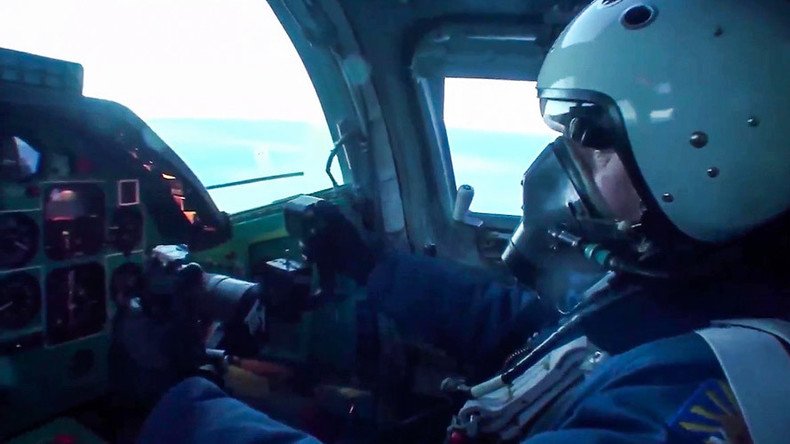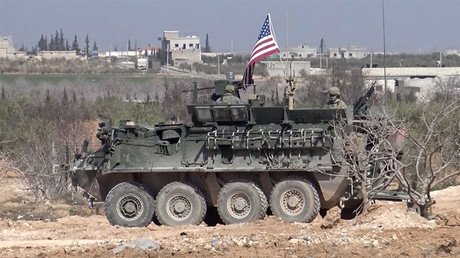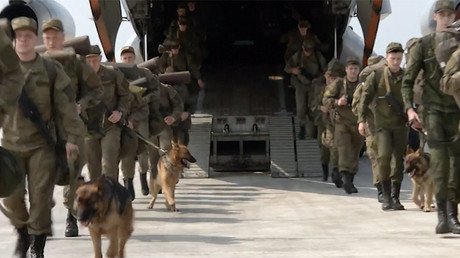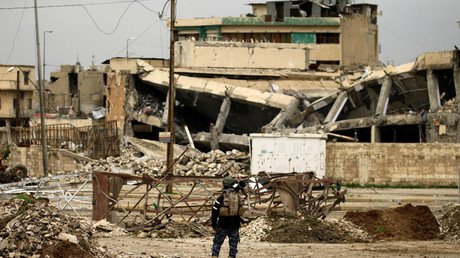While dozens of countries talk about fighting ISIS, Russia is actually doing it – Kremlin

Russia is busy fighting Islamic State terrorists, while dozens of other countries are sitting around discussing it, Russian presidential spokesman Dmitry Peskov said, commenting on the US-led coalition’s ministerial conference underway in Washington DC.
“While dozens of countries continue to discuss battling Islamic State (IS, formerly ISIS/ISIL), Russia is fighting it, day and night, every day,” Peskov told the press on Wednesday.
The United States is hosting the first major high-profile ministerial meeting of the full 68-state US-led coalition since 2014. The conference is set to last for two days, March 22-23. The US delegation is being led by Secretary of State Rex Tillerson, while most nations will be represented by their foreign ministers, as well as some military commanders.
The conference is meant to “accelerate international efforts to defeat ISIS in the remaining areas it holds in Iraq and Syria and maximize pressure on its branches, affiliates, and networks,” according to a State Department statement issued earlier this month. The meeting will also underscore that the US considers “the complete defeat” of the terror group its “top priority in the Middle East,” according to State Department spokesman Mark Toner, who noted that Russia had not been invited to take part in the conference when announcing the meeting some two weeks ago.
Russia’s Foreign Ministry responded by saying that Moscow was not surprised that it had been left uninvited, as it has never participated in such a format and is not part of the US-led coalition.
However Peskov pointed out that, despite its exclusion at the current talks, it will be impossible to achieve success in the global fight against terrorism without Russia’s participation.
“It is impossible to achieve success in the fight against ISIS without the widest possible international cooperation,” Peskov stressed.
In late January, US President Donald Trump ordered the Pentagon, Joint Chiefs of Staff, and other agencies to draft a plan for defeating IS. The US has since deployed additional ground troops in Iraq and Syria, indicating that a long-promised siege of IS’ Syrian capital, Raqqa, may start in the near future.
“We can’t get to de-conflicting the rest of the region with ISIS in the way,” US Secretary of State Rex Tillerson said in an interview with Independent Journal Review ahead of the anti-IS coalition summit.
He explained that the plan is most likely a three-step process, beginning with a military campaign, followed by a transition phase, and ending with some stability program.
The US-led coalition is largely fighting IS in the city of Mosul at the moment, attempting to drive the jihadists out of their main stronghold in Iraq. Iraqi troops, backed by Kurdish Peshmerga forces, Shiite militias, and the US-led coalition, launched an operation to free Mosul from Islamic State terrorists in October of last year. The eastern half was liberated in January, and operations to free the western side are now in full swing.
Meanwhile, Russia has been busy defusing the conflict in Syria, aiding the Syrian army in liberating areas still under IS control.
Despite some observers hoping that the Trump administration would join forces with Russia to fight Islamic State, US Secretary of Defense James Mattis said last month that the Pentagon was “not in a position right now to collaborate on a military level” with Moscow. This may be due, in part, to pressure being put on the Trump administration at home, where critics accuse him and his staff of secretly colluding with Russia to help him win the presidential election. Trump has repeatedly denied the accusations, as has Russia, and no concrete proof backing the claims has ever been presented.















